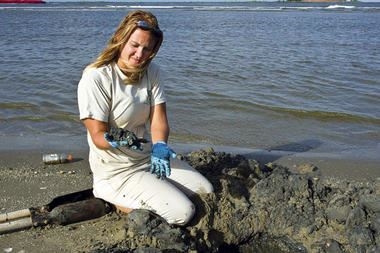 |
| Leanne Sarco is a ranger at Grand Isle State Park, located on a barrier island off the coast of Louisiana. When the oil spill closed beaches and canceled her job running a summer program for children, she asked her boss if she could rescue hermit crabs instead. Her effort attracted volunteers from far and wide. |
Grand Isle, LA.
Leanne Sarco remembers the day she discovered oil in her lagoons. On the first day, a sheen appeared on the ocean water. The sheen grew thicker and wider, until by the end of the week it became clear that this wildlife preserve at Grand Isle State Park, where the Gulf of Mexico meets the fragile barrier islands of Louisiana, was in peril.
In the weeks following the April 20 explosion of a BP oil rig that sent some 172 million gallons of crude oil into the Gulf, federal, state, and local governments; wildlife organizations; university research labs; oil industry groups; and contractors drew up plans to solve the litany of complex problems created by the huge spill.
But Ms. Sarco, a park ranger, thought small. She decided her best contribution was to collect, wash, and release into safer waters hermit crabs, the most neglected creature in the area, according to Lisa Rodrigues, who teaches in the department of geography and the environment at Villanova University near Philadelphia.
Hermit crabs "may seem insignificant at first," but they clean the ecosystem by eating algae, which helps fish and bird populations thrive, Ms. Rodrigues says.
They also are a key part of the food chain, providing sustenance for larger creatures. "A loss of one species could potentially have a significant impact on the rest of the community," Rodrigues says.
Sarco's efforts are voluntary. The Louisiana Department of Wildlife and Fisheries did not mandate a rescue of the crabs. No one knew exactly how to save them from suffocating in the oil inside their shells.
But soon after the oil's arrival on Grand Isle, Sarco began to see thousands of dead crabs along miles of coastline. Those that remained alive struggled to wriggle out of the oil and make it to shore.
Soon it became obvious that her job running a summer program for children would be canceled because of the contaminated beaches at Grand Isle. So Sarco asked her manager at the Louisiana Office of State Parks a simple question: "Can I pick up the crabs and clean them" instead?
She assembled a small army to help. Since May, Sarco and about 150 volunteers from as far away as California and Quebec have collected about 7,000 crabs, scrubbed them of oil, and released them into a saltwater marsh about 15 miles inland.
After asking local friends to pitch in, Sarco turned to Facebook and put out a call to the world. People soon began to arrive, strangers who came to help, some even sleeping on her couch for weeks.
"It almost feels like they're friends," Sarco says of the volunteers. "It was really nice to connect with people like that after thinking no one really cared about the wildlife aspect of [the oil spill]. It really saved me from quitting."
Sarco's project is "inspiring," says Doug Inkley, a senior scientist at the National Wildlife Federation in Reston, Va. It also fits into the larger picture of citizen volunteer groups doing what they can to rescue neglected wildlife in the Gulf, either directly or by raising money, Mr. Inkley says.
"It's very encouraging [that] people care so passionately ... whether it's a little crab or a big sea turtle," he says. "We have to recognize all these organisms are part of the whole ecosystem, and the hermit crab is just as important."
Sarco grew up in New Orleans, about a 2-1/2-hour drive north of Grand Isle, a remote fishing village of 1,500 people where the state park is located and where she now lives. She remembers spending time as a child at a nature center, where she watched as injured animals were coaxed to recovery.
Her first batch of volunteers in June were "disaster tourists," curiosity seekers who just wanted to check out the blackened sand dunes. She persuaded them to grab a pail and start collecting crabs.
On a Monday afternoon in August, Sarco led a small group along the shoreline where, clad in waders and clutching pails, they bent to gather up hundreds of hermit crabs, recently washed ashore and hidden inside shells coated with oil. The beach reeked of petroleum.
The group crossed the dunes to a tower once used as a concession stand that now is headquarters for Sarco's operation. Here hundreds of collected crabs are placed on absorbent fabric.
One by one, their outer shells are lightly scrubbed with dishwashing detergent. The insides of their shells are cleaned with a cotton swab. The crabs then are placed in donated fish tanks.
After only about 30 minutes in the tanks, the crabs slowly return to life. They crawl atop each other and move toward biscuit crumbs Sarco sprinkles into the water.
The next day they are delivered to the inland saltwater marsh and released.
Most coastal scientists say the oil is so embedded in the beach that it will be there for decades. Yet Sarco is already seeing her volunteer numbers start to dwindle, which she suspects is a result of people assuming the problem has been solved as it slips away from news media attention.
She plans for the hermit crab project to continue into next year – or as long it takes. "I don't see how I can [do] ... anything different from that," she says.
Page created on 4/2/2011 11:11:11 AM
Last edited 1/5/2017 9:41:32 PM
